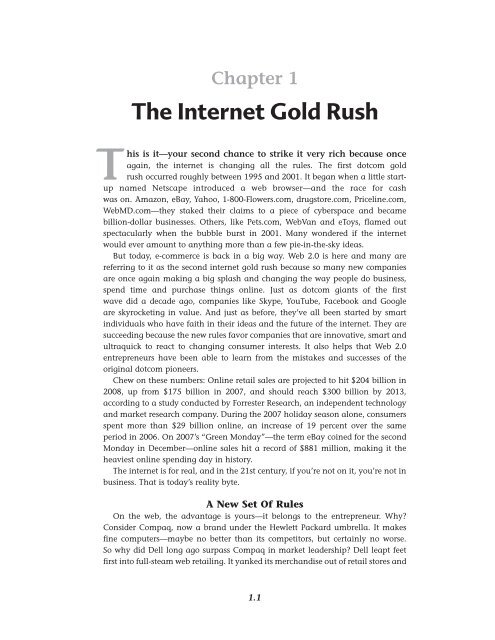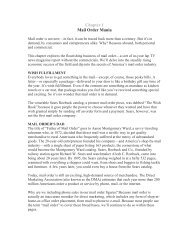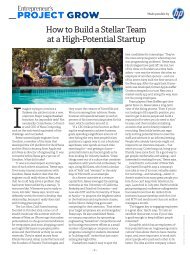The Internet Gold Rush - Entrepreneur.com
The Internet Gold Rush - Entrepreneur.com
The Internet Gold Rush - Entrepreneur.com
Create successful ePaper yourself
Turn your PDF publications into a flip-book with our unique Google optimized e-Paper software.
Chapter 1<br />
<strong>The</strong> <strong>Internet</strong> <strong>Gold</strong> <strong>Rush</strong><br />
This is it—your second chance to strike it very rich because once<br />
again, the internet is changing all the rules. <strong>The</strong> first dot<strong>com</strong> gold<br />
rush occurred roughly between 1995 and 2001. It began when a little startup<br />
named Netscape introduced a web browser—and the race for cash<br />
was on. Amazon, eBay, Yahoo, 1-800-Flowers.<strong>com</strong>, drugstore.<strong>com</strong>, Priceline.<strong>com</strong>,<br />
WebMD.<strong>com</strong>—they staked their claims to a piece of cyberspace and became<br />
billion-dollar businesses. Others, like Pets.<strong>com</strong>, WebVan and eToys, flamed out<br />
spectacularly when the bubble burst in 2001. Many wondered if the internet<br />
would ever amount to anything more than a few pie-in-the-sky ideas.<br />
But today, e-<strong>com</strong>merce is back in a big way. Web 2.0 is here and many are<br />
referring to it as the second internet gold rush because so many new <strong>com</strong>panies<br />
are once again making a big splash and changing the way people do business,<br />
spend time and purchase things online. Just as dot<strong>com</strong> giants of the first<br />
wave did a decade ago, <strong>com</strong>panies like Skype, YouTube, Facebook and Google<br />
are skyrocketing in value. And just as before, they’ve all been started by smart<br />
individuals who have faith in their ideas and the future of the internet. <strong>The</strong>y are<br />
succeeding because the new rules favor <strong>com</strong>panies that are innovative, smart and<br />
ultraquick to react to changing consumer interests. It also helps that Web 2.0<br />
entrepreneurs have been able to learn from the mistakes and successes of the<br />
original dot<strong>com</strong> pioneers.<br />
Chew on these numbers: Online retail sales are projected to hit $204 billion in<br />
2008, up from $175 billion in 2007, and should reach $300 billion by 2013,<br />
according to a study conducted by Forrester Research, an independent technology<br />
and market research <strong>com</strong>pany. During the 2007 holiday season alone, consumers<br />
spent more than $29 billion online, an increase of 19 percent over the same<br />
period in 2006. On 2007’s “Green Monday”—the term eBay coined for the second<br />
Monday in December—online sales hit a record of $881 million, making it the<br />
heaviest online spending day in history.<br />
<strong>The</strong> internet is for real, and in the 21st century, if you’re not on it, you’re not in<br />
business. That is today’s reality byte.<br />
A New Set Of Rules<br />
On the web, the advantage is yours—it belongs to the entrepreneur. Why?<br />
Consider Compaq, now a brand under the Hewlett Packard umbrella. It makes<br />
fine <strong>com</strong>puters—maybe no better than its <strong>com</strong>petitors, but certainly no worse.<br />
So why did Dell long ago surpass Compaq in market leadership? Dell leapt feet<br />
first into full-steam web retailing. It yanked its merchandise out of retail stores and<br />
1.1
Chapter 1 <strong>The</strong> <strong>Internet</strong> <strong>Gold</strong> <strong>Rush</strong><br />
threw the dice, betting the <strong>com</strong>pany’s future on direct selling (via catalogs and<br />
the web) to corporations and individuals. Compaq, meanwhile, faltered at every<br />
step because it didn’t want to alienate its established retail channels, convinced<br />
they would be irked if suddenly the same <strong>com</strong>puters were available for less on the<br />
internet. So Compaq dithered during the infancy of the web, and that indecisiveness<br />
made it lose momentum and leadership while upstarts grabbed market share.<br />
Compared with 20th-century business models, the web is both a new distribution<br />
channel and a new way of doing business. Don’t miss either part of that statement.<br />
Think of the web only as a new channel—a different way of putting products<br />
and services in front of customers—and you miss the threat and the promise of the<br />
internet, which is that it has and will continue to utterly change the business world<br />
and how you do business.<br />
For one thing, the web is ruthless in the squeeze it puts on pricing. Fat and waste<br />
have to go, and good riddance, because many large <strong>com</strong>panies (and too many<br />
small <strong>com</strong>panies) have grown <strong>com</strong>fortably wealthy by exacting indefensible margins<br />
out of the retail process. No more. <strong>The</strong> web stomps margins flat, and to make profits,<br />
<strong>com</strong>panies have to rethink where their dollars will be earned. Big <strong>com</strong>panies (most<br />
of them) have responded to these new rules by shutting their eyes and praying the<br />
moment will pass. (Think of the big banks that treat customers terribly, pay laughable<br />
interest rates and are forever hiking fees. Most are doomed to be dinosaurs.)<br />
All this is good news for you because it means you have a wide-open playing field<br />
before you.<br />
Better still, the opportunities are unlimited. Would it be wise to go head to head<br />
against Google or Amazon? Not directly, because these <strong>com</strong>panies are among the<br />
many internet businesses that can legitimately claim to have established major<br />
consumer brands. But at less than 20 years old, the web is still just a tot in the overall<br />
business world and, as so many of<br />
Dot<strong>com</strong> 2.0’s upstart entrepreneurs<br />
Beware!<br />
Venture capital funding, billions of<br />
dollars’ worth, is out there—but be<br />
prepared for a grilling like you’ve<br />
never had before any check is<br />
signed. Never forget that venture<br />
capitalists are in business<br />
to make money, lots<br />
of it, not to speculate<br />
on chancy<br />
business ideas.<br />
1.2<br />
have shown, possibilities are still<br />
everywhere. Want proof? Read on for a<br />
few amazing stories of internet success<br />
popping up where most people would<br />
least expect it.<br />
Getting Social<br />
Consider Facebook. <strong>The</strong> ultra popular<br />
social networking site was started by<br />
a Harvard student in his dorm room.<br />
As a sophomore, Mark Zuckerberg<br />
had a hunch that his fellow university<br />
students would like to congregate,
Online Business Chapter 1<br />
send messages, load photos and generally flirt with one another online. Within a<br />
year of launching Facebook, Zuckerberg took off for Silicon Valley and hasn’t<br />
looked back since.<br />
Facebook eventually opened its doors to all users, not just students, and it now<br />
has 66 million active users. In 2007, Microsoft purchased a 1.6 percent share in the<br />
social networking <strong>com</strong>pany. Do the math: That’s a $15 billion valuation—and<br />
Zuckerman isn’t even 25 years old yet.<br />
News Corp. purchased social networking site MySpace for $580 million in 2005.<br />
Google paid $1.65 billion for video-sharing site YouTube in 2006. And AOL just<br />
recently picked up Bebo, a favorite social networking site in the United Kingdom,<br />
Ireland and New Zealand, for $850 million.<br />
<strong>The</strong>se are some big figures. While social networking can be a difficult game to<br />
enter, it does show the extreme possibilities are available in our new Web 2.0 world<br />
for innovative entrepreneurs with a good idea.<br />
Claiming Success<br />
Charles Brofman is an internet entrepreneur who has found success pairing fastpaced<br />
internet technology with the slow-paced process of settling insurance claims.<br />
Brofman started Cybersettle Inc.<br />
(cybersettle.<strong>com</strong>), a White Plains, New<br />
York–based online dispute resolution<br />
<strong>com</strong>pany, in 1996. Its web-based<br />
system facilitates high-speed, confidential<br />
claim settlements by matching<br />
offers and demands. Parties can settle<br />
disputes instantly, 24/7, via the internet,<br />
or by calling its customer service<br />
center during normal business hours.<br />
Why did he start the <strong>com</strong>pany?<br />
“<strong>The</strong> courts today literally cannot<br />
handle the onslaught of litigation they<br />
face,” says Brofman, a seasoned trial<br />
attorney. “As a result, people who are entitled to get <strong>com</strong>pensated for their injures<br />
have to wait long periods of time, and insurance <strong>com</strong>panies that have an obligation<br />
to pay—and want to pay—have to wait a long period of time. Cybersettle really<br />
just came out of our frustration with this process.”<br />
Here’s how Cybersettle works: An insurance <strong>com</strong>pany receives a statement of<br />
claim from a plaintiff’s lawyer. When the insurance adjuster reviews the case and<br />
is ready to settle, he then enters three offers into the <strong>com</strong>puter. <strong>The</strong> plaintiff’s<br />
lawyer is informed that the insurer has made an offer, and the lawyer then enters<br />
three demands. <strong>The</strong> Cybersettle main server <strong>com</strong>pares the lawyer’s first offer with<br />
1.3<br />
Smart Tip<br />
Just because your idea might seem a<br />
little out of the ordinary, don’t quit<br />
if you’re a believer. Charles<br />
Brofman didn’t quit, and<br />
his Cybersettle is a big<br />
winner in reinventing<br />
the way insurance<br />
claims are settled.
Chapter 1 <strong>The</strong> <strong>Internet</strong> <strong>Gold</strong> <strong>Rush</strong><br />
the insurer’s, and when the demand falls below the offer, the software splits the<br />
difference and settles the claim. Brofman says the system mirrors the way the<br />
insurance industry does business.<br />
To date, Cybersettle, which can be used in the United States and Canada, has<br />
handled more than 200,000 transactions and has facilitated over $1.5 billion in<br />
settlements, including bodily injury and other types of insurance claims.<br />
In addition, Cybersettle has expanded beyond just insurance. One area is<br />
public entities. A pilot program with New York City started in 2004; by the end of<br />
the first year, the city estimated Cybersettle had saved the city about $11 million.<br />
By 2007, the City <strong>com</strong>ptroller announced that the cost of claim handling for the<br />
city dropped $34 million in the prior fiscal year—and he attributed $27 million of<br />
that savings to Cybersettle.<br />
Cybersettle is also launching a new consumer-to-consumer program in 2008<br />
that will basically be<strong>com</strong>e an online small claims court for the world.<br />
Brofman says there are several reasons why his internet venture is successful.<br />
One, his <strong>com</strong>pany has a “fabulous” investor, a strategic partner who understands<br />
his business. Another is that his business does what the internet was designed<br />
to do, and that is to conduct a transaction 24 hours per day, seven days per week.<br />
“If you are going to do something on the net,” says Brofman, “you have to do<br />
something that the net was designed to do.”<br />
Reaching <strong>The</strong>ir Peak<br />
If you’re willing to expand your horizons a little, as two entrepreneurs discovered,<br />
the sky’s the limit. Consider Jim Holland and John Bresee, who founded<br />
Backcountry.<strong>com</strong>, a Herber City, Utah–based online retailer of outdoor gear for all<br />
things backcountry, in 1996.<br />
Holland, a two-time Olympic ski jumper and six-time national champion<br />
Nordic ski jumper, and Bresee, a former editor of Powder magazine, founded the<br />
<strong>com</strong>pany with the purpose of providing outdoor adventure gear to the hard-core<br />
recreational athlete. Holland and Bresee’s online store has seen triple-digit average<br />
annual growth for the past 10 years. Pretty amazing, considering the fact that they<br />
began the <strong>com</strong>pany without any outside investment.<br />
“We developed the site ourselves and banked about $2,000 of our own money to<br />
get started, which we used for inventory,” says Bresee. “We took a risk but knew<br />
there was an interest out there for what we were doing.”<br />
What’s the <strong>com</strong>pany’s secret to success? <strong>The</strong>re’s not one answer to that question,<br />
but a key reason is that the <strong>com</strong>pany decided to focus on a narrow niche—selling<br />
gear to hard-core sports enthusiasts—instead of <strong>com</strong>peting with mass-market<br />
retailers like REI that might sell the same items, but without the same knowledge.<br />
Backcountry.<strong>com</strong>, for example, populates its call-center staff with hardcore<br />
skiers and trekkers who are out there using the equipment the site sells.<br />
1.4
Online Business Chapter 1<br />
<strong>The</strong>refore, when customers contact<br />
Backcountry.<strong>com</strong> with their questions,<br />
the customer solutions team, known as Opportunity Knocks<br />
“Gearheads,” can answer by drawing on<br />
Always look for a niche the Big Boys<br />
their own unique personal experience. have neglected—then exploit this<br />
Excellent customer service, in fact, opportunity swiftly, before the<br />
is the <strong>com</strong>pany’s mantra. “We make it mega-<strong>com</strong>panies <strong>com</strong>e to<br />
very easy for our customers to <strong>com</strong>mu- their senses. And guess<br />
nicate directly with real people at what: <strong>The</strong>re always are<br />
Backcountry.<strong>com</strong>, whether they have such opportunities. Find<br />
a question or want to make a purchase. yours and move fast.<br />
Our phone number is on every page of<br />
our site, and people can just as easily<br />
opt to IM a Gearhead if they prefer,” says Bresee.<br />
Other reasons for its continued growth? <strong>The</strong> addition of other successful<br />
niche sports gear sites (Tramdock.<strong>com</strong>, Dogfunk.<strong>com</strong>, SteepandCheap.<strong>com</strong>,<br />
WhiskeyMilitia.<strong>com</strong> and BackcountryOutlet.<strong>com</strong>), cost-effective online and<br />
word-of-mouth advertising, and the <strong>com</strong>pany’s philosophy that the risky way is<br />
the safe way.<br />
“If it’s safe, we’re not interested in pursuing it,” says Bresee. “To successfully grow<br />
a business, you have to take risks. In the case of Backcountry.<strong>com</strong>, we’re lucky that<br />
the risks we’ve taken are working out pretty well.”<br />
Film Rentals For <strong>The</strong> 21st Century<br />
Now, what about taking on an established business model and using the<br />
internet to <strong>com</strong>pletely turn it on its head? Travel back to 1997, a time when the<br />
dot<strong>com</strong> era was in full bloom. It was also a time when the idea of renting movies<br />
via mail seemed ludicrous. In fact, many thought that Netflix founders Marc<br />
Randolph and Reed Hastings were nuts. DVD players had just started selling in the<br />
United States in March 1997, yet by October the guys were already executing their<br />
business plan. Despite the odds and the obstacles, they persevered to create Netflix,<br />
a pure-play dot<strong>com</strong> that has revolutionized the movie rental industry.<br />
At the start of this venture, there were plenty of naysayers asking why people<br />
would wait for movies to arrive in the mailbox when they could just go down<br />
the street to Blockbuster. But the founders stubbornly found a way around all<br />
objections and spent countless hours mapping out operational strategies.<br />
Netflix launched in 1998, operating for the first five years with virtually no<br />
advertising money. Even they were surprised by the consumer response. <strong>The</strong> key<br />
was connecting with rabid early DVD adopters on Usenet discussion groups.<br />
Netflix made no public announcements about the site launch, hoping the soft<br />
launch might bring in volumes of more than 10 or so “friends and family” orders<br />
1.5
Chapter 1 <strong>The</strong> <strong>Internet</strong> <strong>Gold</strong> <strong>Rush</strong><br />
per day. But the first day, 500 orders arrived, almost exclusively from Usenet<br />
advocates who noticed the site was live and announced it to their networks.<br />
Within 30 days, the <strong>com</strong>pany was processing 1,000 orders per day; within three<br />
months, they were moving more than 2,000 orders per day, and their phenomenal<br />
growth continued from there.<br />
Netflix has been one of the most successful dot<strong>com</strong> ventures yet. Today, it’s the<br />
world’s largest online DVD movie rental service, serving 7.5 million members and<br />
offering 90,000 movie titles. Its appeal and success are built on providing an<br />
expansive selection of DVDs, an easy way to choose movies, and fast, free delivery.<br />
Incredible stories? You bet, but the internet is filled with them because all the<br />
rules are new in the internet economy. Even the biggest players can be successfully<br />
challenged by the upstart who sees an opportunity, then seizes it.<br />
Better yet, the odds are stacked in your favor because you are little. How? When<br />
a big <strong>com</strong>pany such as Toys “R” Us fumbles its e-<strong>com</strong>merce debut—which it did by<br />
disappointing many holiday season shoppers back in 1999—it makes headline<br />
news and even e-<strong>com</strong>merce history. That <strong>com</strong>pany has a well-established brand;<br />
consumers who shop there, offline or on, shop with expectations. When it made<br />
hash of its web storefront, it hurt.<br />
What if you do likewise—drop a few balls at startup? Customers don’t know you,<br />
don’t have expectations, and odds are you’ll be forgiven. A few years ago, business<br />
guru Tom Peters’ mantra was that the moment had <strong>com</strong>e for business to practice<br />
“Ready, Fire, Aim” because no longer was there latitude to spend months scoping<br />
the target. On the web, too, action counts. Take it—as Netflix did—and you just<br />
may <strong>com</strong>e out way ahead.<br />
Sweet Dreams<br />
Sometimes even when your dreams aren’t so lofty, the internet can still save<br />
the day, as Barbara McCann found out. She and her husband, Jim, owned <strong>The</strong><br />
Chocolate Vault, a store in Tecumseh, Michigan, a village about 60 miles west<br />
of Detroit. <strong>The</strong>y’d watched traffic—and customers—veer away from little towns,<br />
and they’d watched their cash flow dry to a trickle. <strong>The</strong>n they decided to give the<br />
internet a whirl.<br />
On a skimpy budget—a few thousand dollars—Barbara McCann personally<br />
built her website, chocolatevault.<strong>com</strong>, and then she watched an amazing thing<br />
happen. “People from all over the country found us, and they started buying our<br />
chocolates!” she says.<br />
McCann says the internet business has grown so much that she has decided to<br />
close the retail store. In 2005, she moved her internet business and home to another<br />
small town in southeastern Michigan and built a small factory-type facility that<br />
allows the <strong>com</strong>pany more space. McCann says the move was the best decision she<br />
could have made.<br />
1.6
Online Business Chapter 1<br />
McCann doesn’t have the money to buy major advertising space and instead<br />
puts all her energy into offering exceptional customer service. “We are trying to<br />
give our customers the kind of personal service online that they would receive if<br />
they walked into our store,” she says. “We’ve also found ways to customize our<br />
products. For example, we make custom molds for our corporate clients.”<br />
McCann also says that most of her customers are return customers who keep<br />
<strong>com</strong>ing back because the site is understandable and easy to maneuver.<br />
Will <strong>The</strong> Chocolate Vault rise to the top and challenge the biggies in that space,<br />
such as Godiva and others? “Never,” says McCann, who knows her budget and her<br />
ambition. But the big miracle is that “the internet has been a lifesaver for us,” she<br />
says. “We would’ve closed our shop without it.”<br />
Set the scale of your internet ambitions—dream large in the way of Charles<br />
Brofman, or dream on a more diminutive scale like the McCanns—because there<br />
is no “right” approach to the internet. Good, steady money can be earned by strictly<br />
local players who open on the net and find a stream of global business pouring in.<br />
Or big bucks may be yours if you invent a new eBay or Monster.<strong>com</strong>.<br />
<strong>The</strong> E-Commerce Quiz<br />
Think you’re ready to be<strong>com</strong>e a “netpreneur”? Prove it. Before moving<br />
on to the next chapter, take this quiz. Answers are true or false.<br />
1. I’m <strong>com</strong>fortable in a game in which tomorrow’s rules are invented the day<br />
after tomorrow.<br />
2. I see inefficiencies—waste and delay—in many current business practices.<br />
3. I’m willing to delay this year’s profits to potentially make more money<br />
next year.<br />
4. I know how to size up customers I’ve never seen or talked with.<br />
5. <strong>The</strong> net excites me—I honestly like surfing around and seeing what’s new.<br />
6. I can live with thin margins.<br />
7. Customer satisfaction is the most important thing a business can deliver.<br />
8. I’m not afraid of battling titans.<br />
9. I see opportunity where others see risks.<br />
10. I am willing to work harder and smarter than I ever could have<br />
imagined possible.<br />
Scoring: Guess what—“true” is always the right answer for any netpreneur.<br />
But you knew that already because you’re ready to <strong>com</strong>pete on this merciless<br />
playing field.<br />
1.7
















